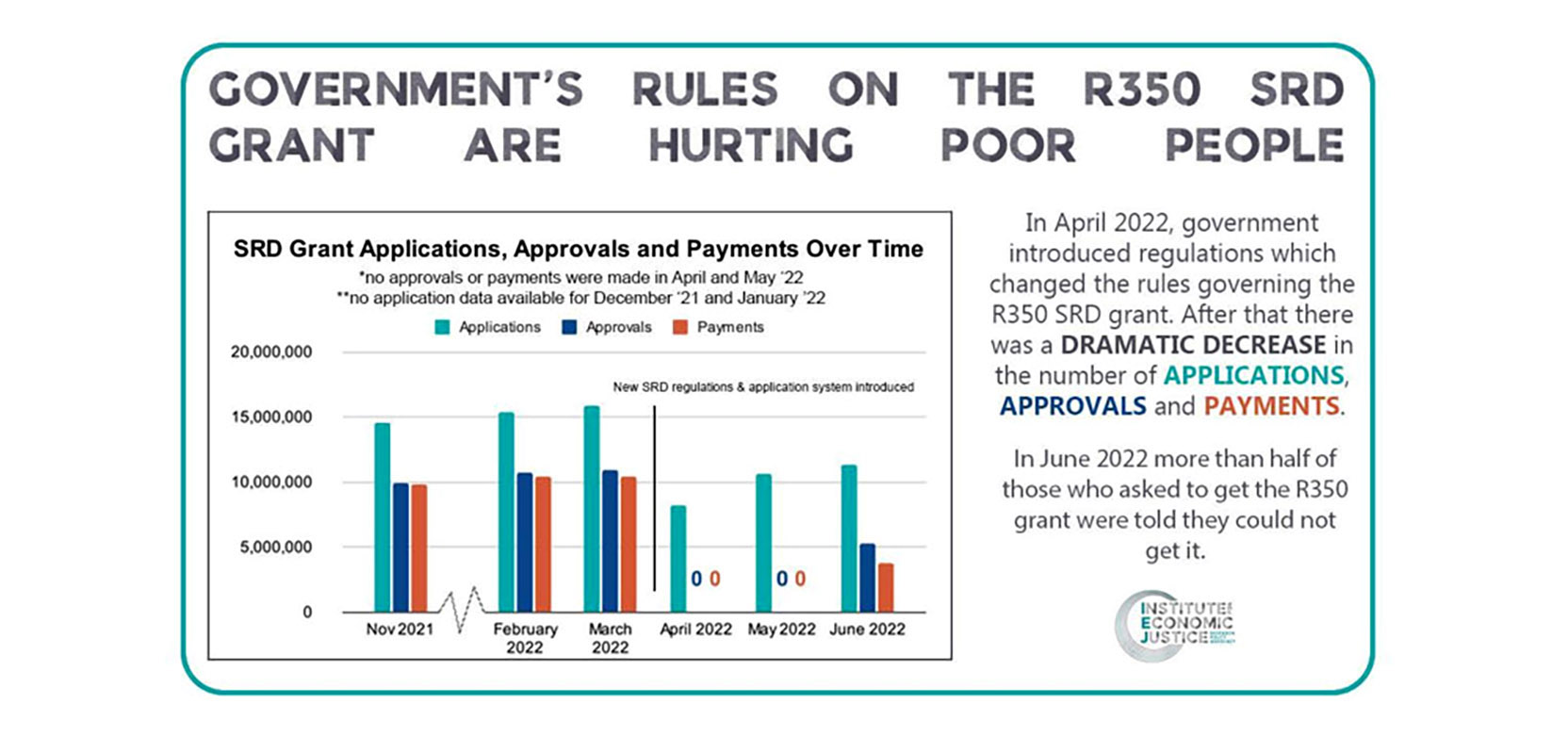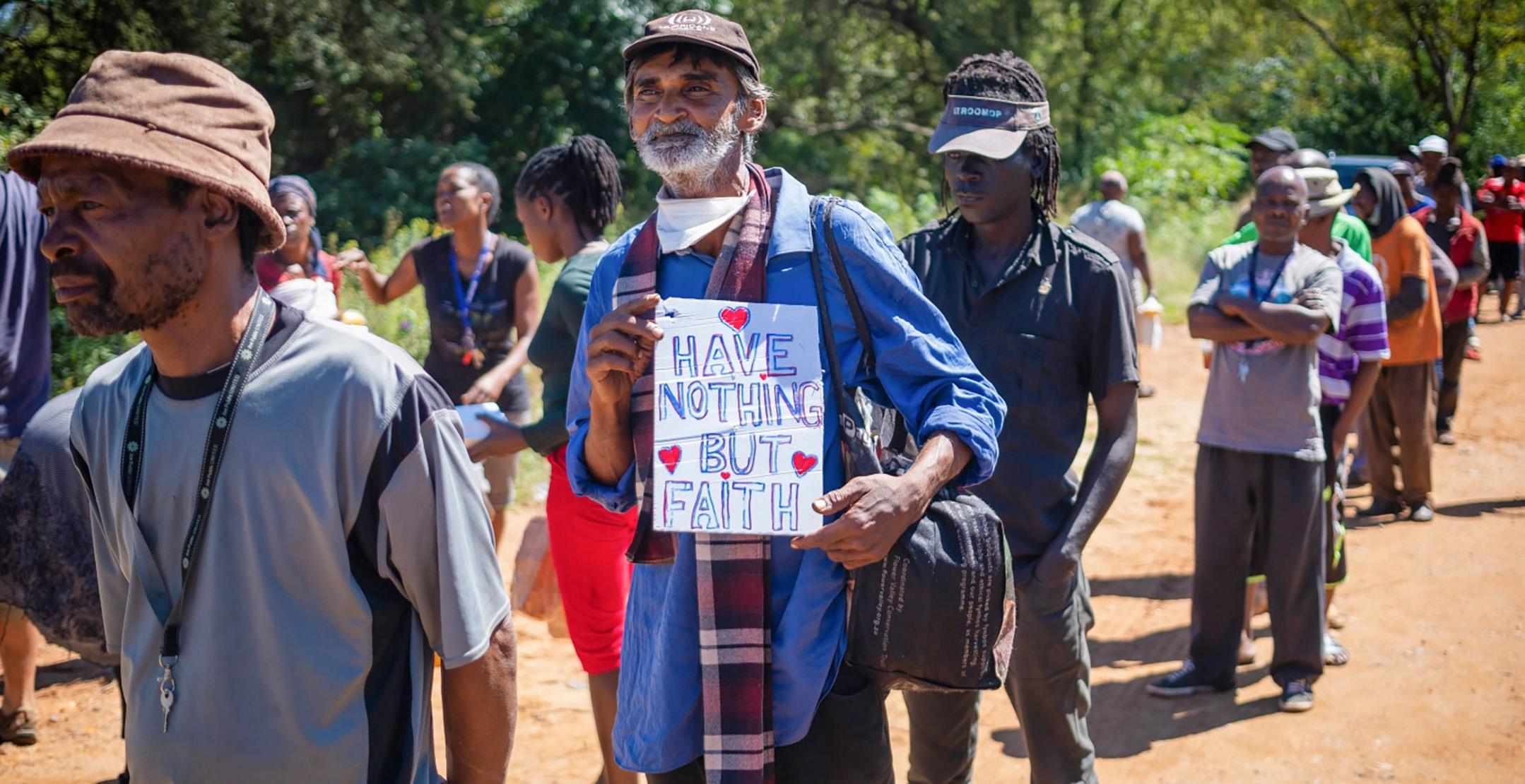POVERTY ALLEVIATION
Proposed amendments to regulations on Social Relief of Distress grant do not go far enough
On 7 July, the Department of Social Development (DSD) issued proposed amendments to the regulations governing the administration of the Social Relief of Distress (SRD) grant. However, civil society organisations believe the amendments fall far short of what is required to reverse the crisis in the delivery of social grants.
The amendments followed legal action by the Black Sash and the Centre for Applied Legal Studies, supported by the Institute for Economic Justice (IEJ) and other coalition partners, to force a response on the part of the government to address the precipitous drop in SRD grant approvals and payments as a result of the changes made to the grant administration in April.
As the IEJ detailed in a press statement last week, this problem is multifaceted with far fewer applications being approved by the SA Social Security Agency (Sassa), far fewer applications being made by disillusioned applicants and the government continually failing to pay successful applicants timeously. If the number paid in March (10.9 million) is used as a baseline, about 27 million fewer SRD grant payments were made than expected over the three months from April to June. Thus:
- No SRD grant payments were made in April or May;
- While 70% of applications made in March were approved (10.9 million), only 50% of applications made in June were approved (5.27 million);
- About four million fewer people applied for the grant in June than in March (11.36 million vs around 15.5 million); and
- Only 66% of approved June applicants (3.72 million) actually received their payments in June, with the backlog spilling into July. This is in contravention of the government’s own undertaking to pay within the month of application.

The DSD and Sassa have acknowledged some of the underlying problems and the proposed amendments are apparently intended to address these issues. However, the amendments fall far short of what is required to reverse the crisis in the delivery of social grants.
Most notably, the amendments propose to raise the means test threshold — the income test below which someone qualifies for the SRD grant — from R350 to the food poverty line of R624. This is a welcome step forward but remains woefully insufficient as a measure to alleviate the widespread poverty South Africa is facing.
Regrettably, the proposed amendments also do not address other key injustices in the administration of the grant, which will continue to exclude millions of people if not corrected. As such, the IEJ and the Socio-Economic Rights Institute (Seri) on Tuesday submitted and made public our detailed formal comments on these draft amendments.
In these comments we respond to three of the changes effected by the regulations, namely:
The changing of the means-test income threshold from R350 to R624
While we acknowledge that the increasing of the threshold and its link to a scientific and objective measure in the form of the food poverty line is a positive change, we continue to believe this should be extended to all those living in poverty and thus advocate for the means test to be set at least to the upper-bound poverty line — currently R1,335 p/m.
The removal of the bank verification as the final determination for means testing
Bank verification remains a problem in the means-testing process, given that it treats any money in an applicant’s bank account as income. This has resulted, for example, in rejections of applicants holding money for family members or friends, applicants receiving child maintenance payments, or even applicants who receive delayed payments of the SRD grant.
In addition, there is little clarity about the relationship between bank verification and the use of UIF or SA Revenue Service (SARS) databases. Those databases are fundamentally flawed and have resulted in as many as one-third of SRD applicants being unfairly excluded. The change in the status of the bank verification does little to address these issues.
The removal of the three-month reapplication process
While we welcome the removal of the requirement for applicants to reapply every three months, we remain concerned about the continuation of the monthly verification process, which we feel is unnecessary, intrusive and an administrative burden on the state. We raise a number of questions regarding how this process takes place in practice and the potential impact on applicants, and propose that Sassa uses a routine income verification every three months, rather than a monthly check, or beneficiaries having to reapply.

Amendments to the Social Relief of Distress grant are having material and devastating consequences on the lives of millions of people who rely on this grant to sustain themselves and their families. (Photo: EPA-EFE / Kim Ludbrook)
In addition to our comments on these proposed amendments, we raise a number of issues with regard to the administration and regulation of the grants which are not addressed by the changes and which we believe the government must address if the crisis with the grants is to be adequately addressed. These include:
- An irrational and harmful budget cap set by National Treasury, which does not provide sufficient funds to cover all of the rightful beneficiaries of the grant. The funds allocated assign sufficient funds for only 10.5 million beneficiaries, while the government’s own figures show that 18.3 million people have a monthly income below R624, the proposed revised threshold. We believe this budget cap is at the root of many of the hurdles introduced by the regulations as a way to limit the number of people who both apply and are approved for the SRD grant.
- A problematic application process which is online only, includes questions that encourage self-exclusion and is only available in English. Reports suggest that about two million (nearly 18%) of applications in June were denied on the basis of “self-exclusionary” answers. Applicants are asked to provide ID details of their partners and parents for no justifiable reason. It is not sufficiently clear which questions are optional and which are compulsory. The application form also asks confusing questions about people’s past employment and methods of survival which cannot provide a basis for a decision about their eligibility. The removal of the Post Office as an administrator of the grants adds to accessibility limitations.
- A narrow appeals process that does not allow applicants to submit new supporting documentation for rejections. This is despite the problems with the bank verification process and SARS and UIF databases, problems which the department and Sassa do not deny.
- A highly problematic work conditionality clause, which has the potential to be deployed in unfair and coercive ways and threatens to distort labour market relations.
- The possibility that Sassa can “recover” funds from applicants’ bank accounts and the potential impact this may have on grantees.
These issues are not limited to abstract questions of the law. Responses to Sassa’s tweets on the grant system reveal the frustration and desperation that millions of South Africans are facing as a result of these problems. They are having material and devastating consequences on the lives of millions of people who rely on this grant to sustain themselves and their families.
For all these reasons, we continue to call on the government to address these issues and expand access to this critical lifeline. DM/MC
A summary of the IEJ and Seri recommendations and the full submission can be accessed here.
Carilee Osborne is a research associate at the Institute for Economic Justice.


















 Become an Insider
Become an Insider
Comments - Please login in order to comment.